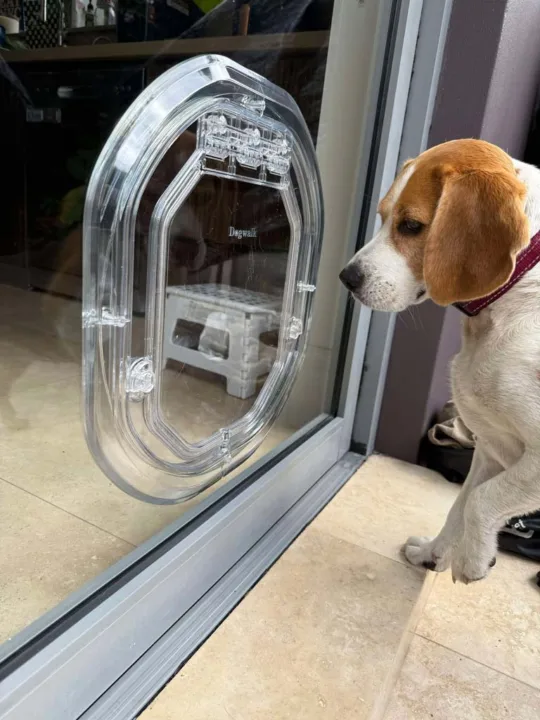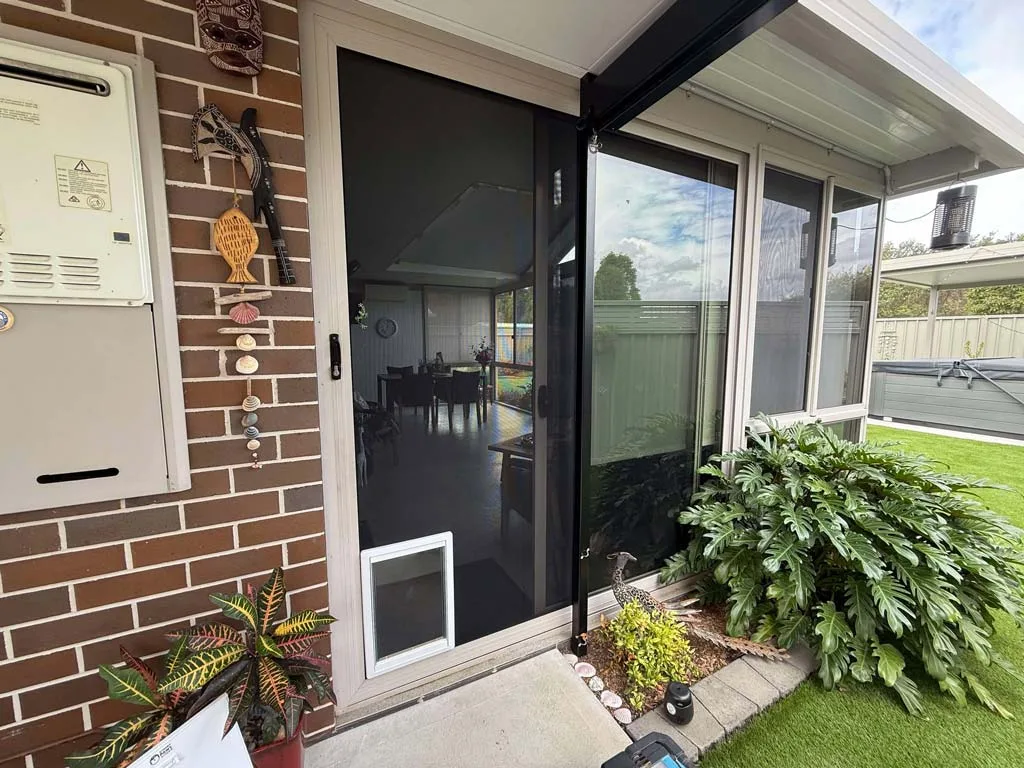Dogs are natural explorers. From their wolf ancestors to the domesticated companions we cherish today, a deep-seated instinct to roam, sniff, and interact with the natural world lies within every canine. While some breeds are content with cosy indoor living, many truly thrive when given consistent access to the outdoors, benefiting immensely from the physical and mental stimulation it provides.
For these adventurous spirits, being able to move freely between indoor comfort and outdoor exploration isn’t just a luxury, it’s fundamental to their happiness and well-being. This is where the thoughtful integration of a dog door can be a game-changer, offering the autonomy and independence that outdoor-loving breeds crave.
In this comprehensive guide, we’ll explore various dog breeds that inherently love the outdoors, delve into why consistent outdoor access is so crucial for them, and show how a well-chosen dog door can facilitate a harmonious, enriched lifestyle for both pet and owner.
The Irrefutable Benefits of Outdoor Access for Dogs
Before we dive into specific breeds, let’s understand why outdoor access is so vital. It’s more than just potty breaks; it contributes to a dog’s holistic health:
- Physical Exercise and Energy Release: Many breeds have high energy levels and require significant physical activity to stay healthy and prevent destructive behaviours. Outdoor access allows them to run, play, and burn off excess energy naturally.
- Mental Stimulation: The outdoors is a sensory wonderland for dogs. New smells, sights, and sounds provide rich mental stimulation, which is just as important as physical exercise for preventing boredom and anxiety.
- Behavioural Regulation: Dogs with consistent access to the outdoors are often calmer and better behaved indoors. They have an outlet for their natural instincts (like sniffing, patrolling, or basking in the sun), reducing the likelihood of issues like excessive barking, chewing, or restlessness.
- Improved Potty Training & Health: Easy access to an outdoor potty area can significantly aid in house-training, reduce accidents , and promote better urinary health, especially for puppies, senior dogs, or those left alone for extended periods.
- Reduced Separation Anxiety: For some dogs, the ability to change their environment and move freely can reduce feelings of confinement, a key trigger for separation-related stress. It allows them to self-soothe by choosing to go outside when feeling anxious.
- Independence and Confidence: Giving a dog the freedom to make low-stakes decisions, like choosing when to go outside, builds confidence and a sense of autonomy. This fosters a more balanced and secure canine companion.
Breeds That Truly Thrive Outdoors (with the Freedom to Roam)
While every dog benefits from outdoor time, some breeds are practically hardwired for it. They possess the energy, resilience, and curiosity that makes them ideal candidates for a lifestyle that includes ample outdoor access.
The High-Energy & Working Breeds
These dogs were bred for tasks that required endurance, intelligence, and a strong drive to be active. They need significant outlets for their energy, and simply walking them on a leash a few times a day might not be enough.
- Labrador Retriever: Consistently one of the most popular breeds, Labs are famously energetic, friendly, and love to retrieve. They excel in outdoor activities like swimming, fetch, and hiking. Their dense, water-repellent coat makes them well-suited for various weather conditions. A dog door allows them to dash outside for a quick game of fetch or a swim if a pool is accessible.
- Golden Retriever: Similar to Labs, Goldens are enthusiastic, intelligent, and have a deep love for the outdoors. They thrive on activity and companionship, enjoying long walks, runs, and retrieving. Their gentle nature makes them great family dogs, but their energy levels demand consistent outdoor play.

- Border Collie: Known as one of the most intelligent dog breeds, Border Collies were bred for herding and possess incredible stamina and a strong work ethic. They need a “job” to do, and ample outdoor space allows them to express their natural instincts, whether it’s herding sheep, playing advanced fetch, or agility training. Without sufficient mental and physical challenges, they can become bored and destructive.
- Australian Shepherd: Another highly intelligent and energetic herding breed, Australian Shepherds are agile and love to be active. They thrive in environments where they can run, play, and engage their minds. Their loyalty makes them excellent companions, but their need for activity is paramount.
- Siberian Husky: Bred as sled dogs, Huskies are built for endurance and cold weather. They have an innate desire to run and explore. Their thick double coat protects them from the elements, and they truly shine when they have the freedom to roam (in a securely fenced area, of course, as they are known escape artists!).
- German Shorthaired Pointer: A highly versatile hunting dog, the GSP is bursting with energy and athleticism. They love to run, swim, and explore. They are incredibly intelligent and thrive when given tasks and plenty of outdoor exercise. A GSP without sufficient outdoor time can quickly become restless.
- Vizsla: Known as the “Velcro Vizsla” due to their affectionate nature, these Hungarian hunting dogs are also incredibly energetic and require extensive exercise. They are graceful, agile, and love to run and swim. They need to be active to be happy and calm indoors.
- Weimaraner: Elegant and athletic, Weimaraner are powerful hunting dogs that need a lot of physical activity. They are known for their speed and stamina and thrive in homes where they can get plenty of outdoor time for running, hiking, and playing.
The Adventurous & Resilient Breeds
These breeds often have a rugged build and a strong independent streak, making them excellent companions for outdoor adventures.
- Bernese Mountain Dog: While large and seemingly calm, Bernese Mountain Dogs are working dogs that appreciate cool weather and outdoor time. They enjoy moderate exercise, such as walks, hikes, and playing in the snow. They need space to stretch out and enjoy the fresh air.
- Great Pyrenees: Originally bred to guard livestock, Great Pyrenees dogs are large, calm, and protective. They enjoy being outdoors, observing their surroundings, and have a thick coat that provides insulation in cooler climates. They appreciate having a large yard to patrol.
- Alaskan Malamute: Similar to Huskies but larger and more powerful, Malamutes were bred for hauling heavy loads. They have immense strength and endurance and thrive in cold environments with plenty of space to move. They need regular, vigorous exercise to be content.
- Portuguese Water Dog: These intelligent and energetic dogs were bred to work in the water, retrieving fish and nets. They are excellent swimmers and love all water-related activities. They require significant daily exercise and thrive in homes with access to water or ample outdoor space for active play.
The Smaller Dogs with Big Outdoor Personalities
Even smaller breeds can have a strong desire for outdoor access and benefit greatly from the freedom a dog door provides.
- Jack Russell Terrier: These small but mighty terriers are bundles of energy and curiosity. They were bred for hunting vermin and possess an incredibly strong prey drive. They need plenty of opportunities to run, dig, and explore in a secure outdoor environment.
- Beagle: With their powerful noses and endless curiosity, Beagles are natural explorers. They love to follow scents and need plenty of exercise to satisfy their instincts. A securely fenced yard with dog door access allows them to indulge their sniffing adventures safely.
- Corgi (Pembroke Welsh & Cardigan Welsh): Despite their short legs, Corgis are active herding dogs with surprising stamina. They enjoy outdoor play and require regular exercise to maintain their sturdy build and active minds. They love to explore and keep an eye on their “flock” (you!) from the comfort of their yard.
How Dog Doors Enable This Freedom
For owners of these outdoor-loving breeds, a dog door isn’t just a convenience; it’s a vital tool for enriching their dog’s life and managing their energy levels. It allows dogs to:
- Self-regulate: Go out for a potty break or a sniff whenever needed, without waiting for human intervention.
- Burn energy: Access a yard or secure area for a quick burst of zoomies or play.
- Find their calm space: Step outside for fresh air or sunbathing when the indoor environment is too stimulating.
- Reduce destructive behaviours: Provide an outlet for natural instincts, preventing boredom-induced chewing or digging indoors.
Sydney Paws Pet doors understands the unique needs of outdoor-loving breeds and offers a wide range of dog door solutions to facilitate this essential freedom:
- Dog Doors for Glass Sliding Doors: Perfect for modern homes and apartments with balcony access, these offer a clean, seamless look.
- Dog Doors for Timber Doors: A classic choice for traditional backdoors, blending perfectly with your existing decor.
- Dog Doors for Security Screen Doors: Allows your dog access while maintaining the security of your home.
- Patio Panel Dog Doors: The ultimate non-permanent solution, ideal for renters or those who prefer no modifications. These slide directly into your existing sliding door track and are easy to remove when you move.

- Custom Solutions: For unique installations or specific requirements, our team can provide tailored advice and fittings.
All our installations are professional, no-mess, and designed to seamlessly integrate into your home, enhancing both your pet’s life and your own peace of mind.
Important Considerations for Outdoor Access
While providing outdoor access is incredibly beneficial, it’s crucial to do so responsibly and safely.
- Secure Fencing/Enclosure: This is non-negotiable, especially for breeds with a high prey drive or a tendency to roam (like Huskies or Beagles). Ensure your yard is securely fenced with no escape routes. For apartments, secure balconies or enclosed “catios” (for cats, but the principle applies to small dogs too) are essential.
- Shelter and Water: Even with a dog door, your outdoor area should provide adequate shade and fresh water, especially during warmer months.
- Pest Control & Plant Safety: Regularly check your dog for ticks and fleas, and ensure any outdoor plants are non-toxic to dogs.
- Training: While many dogs take to dog doors naturally, some may need a little guidance. Our team offers expert dog door training with every installation to ensure your dog confidently uses their new freedom from day one.
- Weather Considerations: While many of these breeds tolerate cold, extreme weather (hot or cold) still requires careful monitoring. A dog door allows them to retreat indoors when conditions are unfavourable.
- Security: All our dog doors come with secure locking mechanisms to ensure only your pet has access and to maintain your home’s security. Microchip-enabled doors are an excellent option for multi-pet homes or for preventing strays from entering.
Final Thoughts: A Happier Dog, a Happier Home
For breeds that inherently love the outdoors, providing consistent, safe access to the fresh air and stimulating environment isn’t just about convenience – it’s about fulfilling their natural instincts and promoting a balanced, healthy life.
A dog door, expertly installed by Sydney Paws Petdoor, acts as a bridge between their indoor comfort and the outdoor world they crave. It empowers them with independence, reduces common behavioural issues, and ultimately fosters a calmer, more confident, and happier companion.
If you have an outdoor-loving breed, or simply want to enhance your dog’s quality of life, consider the profound benefits of a professionally installed dog door. It’s an investment in their well-being and your peace of mind.
Ready to give your adventurous dog the freedom they deserve?
Contact Sydney Paws Petdoor today to explore the best dog door options for your home and discover how seamless and stress-free installation can be. Let us help your furry friend thrive with the joy of independent outdoor access!
Dog Doors for Outdoor-Loving Breeds FAQs
Q1: What kind of dog door is best for a very active, outdoor-loving breed?
A1: For active breeds, durability and security are key. We offer robust dog doors suitable for glass, timber, and security screen doors. For renters, our non-permanent patio panel dog doors are an excellent solution that provides the same level of freedom without structural modifications. The best choice depends on your home’s specific layout and your pet’s size.
Q2: Will my dog learn to use the dog door easily if they’re used to going outside on a leash?
A2: While many dogs adapt quickly, some may need gentle encouragement. Sydney Paws Petdoor includes expert dog door training with every installation. We provide on-site coaching and follow-up support to ensure your dog confidently learns to use their new door, building their independence from day one.
Q3: Is it safe to let my dog have free access to the outdoors with a dog door?
A3: Safety is paramount. When installing a dog door, it’s crucial to ensure your outdoor area is fully secured with adequate fencing to prevent escapes. Our dog doors come with secure locking mechanisms to ensure controlled access. For certain areas, features like microchip activation can prevent unwanted animals from entering your home.
Q4: Can I get a dog door installed in an apartment for my outdoor-loving dog?
A4: Absolutely! Patio panel dog doors are ideal for apartments as they fit into existing sliding door tracks without requiring any permanent modifications, making them strata-friendly and perfect for renters. We also offer glass-compatible dog doors for owners with strata approval for direct balcony or courtyard access.
Q5: How do dog doors help with my high-energy dog’s behaviour?
A5: Dog doors provide high-energy dogs with a continuous outlet for their physical and mental needs. By allowing them to go outside when they feel restless or need to explore, it can significantly reduce boredom, destructive chewing, excessive barking, and overall anxiety, leading to a calmer and more content dog indoors.


